- Hasiera
- Burututako proiektuak
Burututako proiektuak
EUROFLOW
| A EUROpean training and research network for environmental FLOW management in river basins | 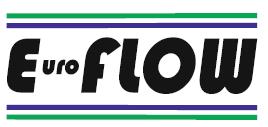 |
|
|
A EUROpean training and research network for environmental FLOW management in river basins. |
||
EQUIVAL
| Nurturing a Shift towards Equitable Valuation of Nature in the Anthropocene |  |
|
|
In order to secure more ethical and more effective approaches for nature conservation, social equity needs to be integrated as a key aspect in environmental governance. This involves recognizing and creating transparent and participatory mechanisms that can explicitly include the voices of the diversity of stakes and worldviews about human-nature relations. This necessarily requires that valuation of biodiversity (a shorthand for nature or any biotic system as seen by modern science, or other knowledge systems) is also an equitable process. Equitable valuation requires: recognition of diversity of worldviews on human-nature relations, guaranteeing transparent participation of stakeholders, and being mindful of the distribution of benefits and burdens of valuation-based decisions. |
||
SABER CULTURAL
| SAfeguarding Biodiversity and Ecosystem seRvices by integrating CULTURAL values in freshwater management: learning from Maori | ||
|
Freshwater ecosystems are essential to people´s economic, cultural and social wellbeing, yet are still one of the most seriously threatened ecosystems on the planet. This conflict is reflected in political regulations that ask to halt the loss of, restore and safeguard freshwaters, their biodiversity and the ecosystem services they provide. Ecosystem-Based Management (EBM), a holistic approach advocated to help doing so, involves an overarching regulatory framework and local solutions with trade-offs and compromises - factors that make decision processes complex and easily co-opted. |
||
ESPA-Frontiers
| Landscapes in transition: synthesising knowledge on trade-offs between land use changes, ecosystem services and wellbeing. |
 |
|
|
Agricultural intensification is a dominant environment and development policy intervention in landscapes characterised by shifting cultivation and/or by a mosaic of farm and forest lands. And yet recent studies from ESPA and beyond are beginning to show that the outcomes of such interventions can frequently fail in their intentions to alleviate poverty and reduce losses of forests and biodiversity. The main objective of this research is to improve our understanding of the effects of agricultural intensification, with a view to better understanding how agricultural policy and interventions can be more sustainable and pro-poor. |
||
ALICE
| AcceLerate Innovation in urban wastewater management for Climate changE |  |
|
|
The challenges facing society in urban wastewater management cannot be solved by any one sector alone. ALICE (AcceLerate Innovation in urban wastewater management for Climate changE) will accelerate innovation by bringing together and exchanging knowledge between the key players who can, together, address the future techno-economic, governance and societal challenges arising from climate change. It will boost international and interdisciplinary skills, as well as careers perspective of Experienced Researchers, Early Stage Researchers, and the workforce of industry, water utilities and public organizations. The results will 1) benefit water utilities, 2) support political and managerial decisions in wastewater, 3) benefit wastewater equipment manufacturers, identifying new market opportunities in the EU, 4) benefit EU citizens from the improved wastewater infrastructure, the environment and job creations. |
||
CLOCK
| Climate Adaptation To Shifting Stocks | 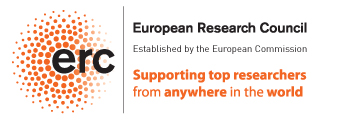 |
|
|
Management of marine fisheries is still far from incorporating adaptation to climate change, even though global stocks are heavily overexploited and climate change is adding additional pressure to the resource. In fact, there is growing evidence that current fisheries management systems may no longer be effective under climate change, and this will translate into both ecological and socioeconomic impacts. This research project argues that the combination of fisheries management science and socio-ecological systems thinking is necessary in order to advance in fisheries adaptation to climate change. |
||
ESPERA
| La Equidad Social en los Pagos por Servicios Ambientales (PSA): Una Perspectiva Socio- Ecológica | 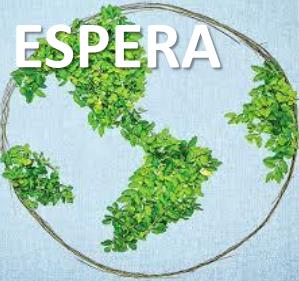 |
|
|
El objetivo principal de ESPERA es contribuir al conocimiento del impacto de los PSA (Pagos por Servicios Ambientales o ecosistémicos) sobre la equidad social y sus interrelaciones (trade-offs) con la efectividad ambiental y la eficiencia económica, desde la perspectiva socio-ecológica de los servicios ecosistémicos. ESPERA avanzará en el desarrollo de un marco conceptual siguiendo el trabajo de Pascual et al (2010; 2014) mediante la introducción de las relaciones de poder entre los actores de los PSA, una variable normalmente obviada en la literatura sobre PSA). |
||
REBECOM
| Estimación del tiempo de recuperación de bosques templados tras impactos antropogénicos históricos a lo largo de un gradiente de complejidad |  |
|
|
Para reducir la acelerada perdida de diversidad, funciones y servicios de los ecosistemas, se han iniciado multitud de estrategias y programas de restauración por todo el mundo impulsados por las iniciativas de la Convención sobre la Diversidad Biológica o la Comisión Europea. Sin embargo, se ha comprobado en humedales, ríos y otros hábitats que los ecosistemas restaurados son menos funcionales y son menos diversos que los conservados (relativamente no perturbados) durante largos periodos de tiempo (>100 años). Esto puede deberse a muchos factores, pero está relacionado con el tiempo que tardan los ecosistemas en recuperarse completamente y con los parámetros usados para medir el éxito de la restauración. En este proyecto, medimos la evolución de algunas interacciones a lo largo de una cronosecuencia de 500 años para entender el proceso de recuperación de la estructura profunda de los ecosistemas. |
||
SEES
|
El Papel de la Equidad Social en la Gobernanza de la Naturaleza desde una Perspectiva Socio-Ecológica
The role of Social Equity in the Governance of Nature: A Social-Ecological approach |

|
|||
|
SEES tiene como finalidad contribuir al conocimiento y ayudar a los tomadores de decisiones y agentes involucrados en la conservación de la naturaleza para gestionar adecuadamente la interrelación entre la conservación y la equidad social desde un enfoque socio-ecológico, y por tanto más allá de una perspectiva biofísica, tal y como normalmente se analizan los instrumentos de la conservación. El objetivo general del proyecto es analizar empíricamente los impactos de equidad en los programas de pagos por servicios ambientales (PSA) como sistema de gobernanza de la conservación. Este objetivo surge del escaso énfasis conceptual y empírico del marco de los servicios de los ecosistemas sobre la equidad y los instrumentos de conservación (distribución de costes y beneficios, reconocimiento de valores de distintos actores y los procedimientos participativos). El marco conceptual en el que se basa la investigación parte de varios estudios publicados recientemente (p.e., Pascual et al 2010, Corbera y Pascual 2012, Narloch et al 2013 y Pascual et al 2014). Se realizarán casos de estudio en América Latina debido al énfasis e interés por los programas de PSA en la región. Los resultados serán diseminados tanto a investigadores como a tomadores de decisiones a nivel global.
|
||||
ISAGE
| Innovation for Sustainable Sheep and Goat Production in Europe | 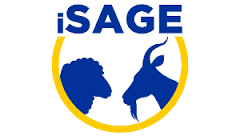 |
|
|
iSAGE will enhance the sustainability, competitiveness and resilience of the European Sheep and Goat sectors through collaboration between industry and research. iSAGE have a powerful consortium with 18 industry representatives from various EU production systems and socio-economic contexts. The sheep and goat sector will be investigated because it is sensitive to general socio-economic, demographic, and ecological and market challenges; nevertheless, the project’s approach and results will be made available and disseminated to other EU livestock industries. Therefore, at the core of iSAGE is a participatory approach centered on a multi-actor internal and external communication (WP) to build the project from the farmer level. |
||
NEREA5
| Modelización de las emisiones de N y C usando el DNDC para obtención de factores de emission dentro de diferentes prácticas agrícolas | ||
|
Una de las principales prioridades para la agricultura del futuro, según la Commission on Sustainable Agriculture and Climate Change (2011), es promover la intensificación de la producción agrícola reduciendo impactos ambientales como las emisiones gaseosas (N2O, CO2, CH4, NOx y NH3). Para poder actuar en esta línea a través de prácticas agrícolas es necesario entender bien la dinámica del N y su relación con el ciclo del C y agua en sistemas agrarios. |
||
CAUSE
| Evaluación y valoración comparativa de los servicios de los ecosistemas en los sistemas agro-forestales: una metodología para la priorizacion de políticas con incidencia sobre los usos del suelo | ||
|
El objetivo de CAUSE es analizar los mecanismos biofísicos de la provisión de los servicios ecosistémicos (SE) así como las implicaciones económicas que estos pueden tener permite a nuestra sociedad equilibrar ambos lados de la ecuación “medio ambiente vs. economía”, resultando en una mejor gestión y gobernanza. Hasta ahora, las aproximaciones a la cuantificación de los SE han ignorado su compleja dinámica y su estructura ecológica multidimensional, resultando en estimaciones de provisión de SE, usos y flujos, que no ofrecen la exactitud espacial o la precisión necesaria para informar de forma eficiente a la toma de decisiones. Estas aproximaciones no permiten tampoco un análisis basado en escenarios de una forma cuantitativa y explícita espacialmente. |
||
WISER
| WISER: Which Ecosystem Service Models Best Capture the Needs of the Rural Poor? | ||
|
It is widely acknowledged that poor rural communities are frequently highly dependent on ecosystem services (ES) for their livelihoods, especially as a safety net in times of hardship or crisis. However, a major challenge to the understanding and management of these benefit flows to the poor is a lack of data on the supply, demand and use of ecosystem services by the poor, particularly in the developing world where dependence on ES is often highest. Recent work suggests that errors associated with the commonly used global proxies (such as benefits transfer) are likely to be substantial and therefore confuse or worse, misdirect, policy formulation or management interventions (such as perverse subsidies). Given these issues, recent improvements in integrated modelling platforms - in some cases founded on desktop process-based models - which aim to provide improved and dynamic maps of current and future distributions of ES have much to offer ES-based poverty alleviation interventions and policy. While these next generation process-based models appear to have a role to play in ES-based poverty alleviation efforts, the level of sophistication and data needs that is required to deliver policy relevant information is poorly understood. It is, for example, unclear whether even the most sophisticated process-based biophysical model is able to provide sufficiently accurate information for regional- or local-scale policy decision making when based on globally available datasets. Similarly, there has been no attempt to quantify the degree to which disaggregation of beneficiaries is necessary within integrated modelling platforms to provide information on managing natural assets that is relevant to the poorest people. |
||
ASSETS
| Attaining Sustainable Services from Ecosystems |  |
|
|
The ASSETS project aims to explicitly quantify the linkages between ecosystem services that affect – and are affected by – food security and nutritional health for the rural poor at the forest-agricultural interface. The project proposes to integrate a suite of complexity tools and cutting edge models with more traditional participatory assessments in the field within a modified version of the Drivers-Pressures-States-Impacts-Response methodological framework to: identify how dynamic stocks and flows of ecosystem services at the landscape scale translate to local-level nutritional diets and health; and inform policy makers on how future land use and climate change will affect both food security and the ecosystem services associated with it. |
||
BASE
| Bottom-up Climate Adaptation Strategies towards a Sustainable Europe |  |
|
|
Climate change can disrupt ecological, social and economic systems, with some regions and sectors suffering significantly. Therefore, adaptation plays a paramount role in responding to climate change. Progress has been made, but there are still important obstacles. Knowledge of the benefits and costs of adaptation is sparse, unsystematic and unevenly distributed across sectors and countries. Planning suffers from substantial uncertainties in terms of precise impacts. It is also difficult to reconcile the bottom-up nature of adaptation with top-down strategic policy making on adaptation |
||
WISE-UP
|
Water Infrastructure Solutions from Ecosystem Services Underpinning Climate Resilient Policies and Programmes (WISE-UP to Climate) |
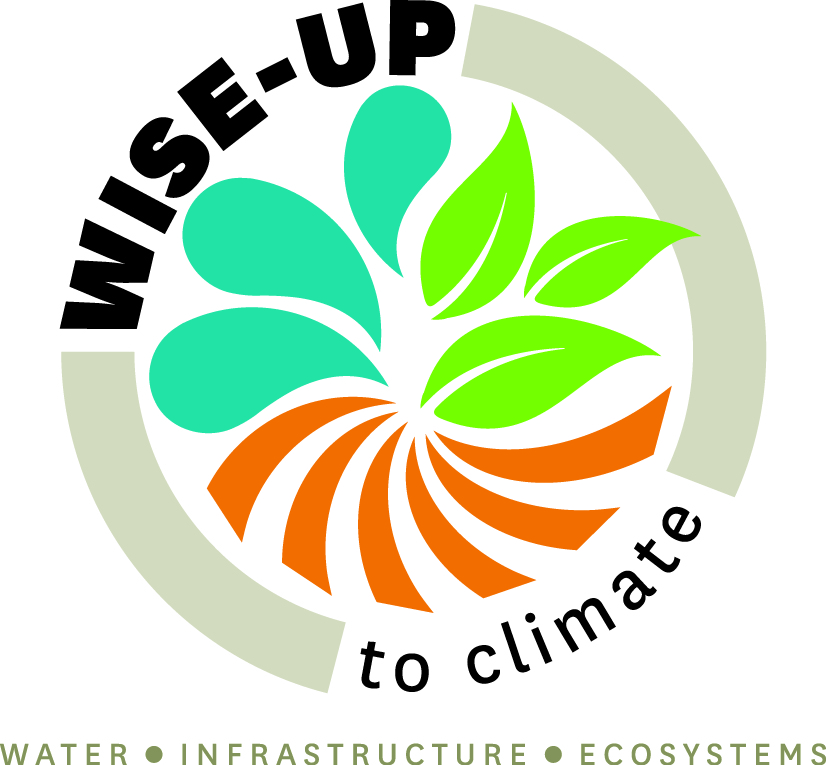 |
|
|
WISE-UP project brochure (PDF, 3MB) Major new climate financing for adaptation is coming on stream with water infrastructure as a priority. Ecosystem services need to be linked more directly and clearly into water infrastructure development, for climate change adaptation and integration into water, food and energy security. If river basins themselves are treated as natural infrastructure, based on the ecosystems services they provide, then infrastructure planning and investment can consider alternate ‘portfolios’ of built and natural infrastructure. This project will develop, test and demonstrate approaches to using portfolios of built and natural water infrastructure development to achieve more optimal outcomes for the multiple goals of poverty reduction, water-food-energy security, biodiversity conservation and climate resil-ience. WISE-UP will demonstrate the application of natural infrastructure as a ‘nature-based solution’ for climate change adaptation and more sustainable development in the Volta and Tana river basins of West and East Africa respectively. |
||
OPTIBARN
|
Optimised animal specific barn climatisation facing temperature rise and increased climate variability |
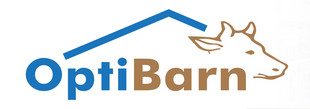 |
|
|
OptiBarn tends to develop region-specific, sustainable adaptation strategies for dairy housing, focusing on an optimised climatisation of naturally ventilated buildings (NVB). Naturally ventilated buildings are particularly vulnerable to climate change since the indoor climate strongly depends on the extremes and variability of the outdoor climate. Without sound adaptation strategies, increased climate variability will result in a sub-optimal thermal environment in many livestock buildings impairing production and welfare of animals. |
||
AQUACROSS
|
Knowledge, Assessment, and Management for AQUAtic Biodiversity and Ecosystem Services aCROSS EU policies |
 |
|
|
AQUACROSS seeks to expand current knowledge and foster the practical application of the ecosystem-based management (EBM) concept for all aquatic (freshwater, coastal, and marine) ecosystems (as a continuum) by contributing to the development of robust and cost-effective responses integrated management practices, and innovative business models addressing current and future changes in major drivers and pressures, integrated management practices, and innovative business models (Fig. 1). It thereby provides an unprecedented effort for seeking synergies and overcoming barriers between policy objectives, concepts, knowledge, data streams, and management approaches for freshwater, coastal, and marine ecosystems to support the timely achievement of the targets set out by the EU 2020 Biodiversity Strategy and the Strategic Plan for Biodiversity (2012-2020) adopted at COP10 of the Convention on Biological Diversity (CBD). |
||
